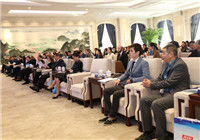
Arman SadyKov (second from right), head of the Kazakhstan A-Education agency, attends the launch of a Jiangsu Provincial Talent Selection Program in Nanjing, capital of Jiangsu, on Dec 18.
Jiangsu province is fueling new ways to attract students from countries involved in the Belt and Road Initiative (BRI) countries. Zhang Xiang reports.
Indonesian student Narulita Wardhani used to worry about whether she would be able to secure a good job after university, as employment pressure for fresh graduates in Indonesia is "unimaginably high".
That was before she entered Nanjing Polytechnic Institute (NPI), a college based in Jiangsu, East China. The school offers joint programs with Chinese employers with operations overseas, provides skills training for international students, and helps them find jobs with Chinese businesses in their home countries after graduating.
Narulita completed her program earlier this year and smoothly secured a job at the Indonesian branch of Jiangsu Delong Nickel Co. Now, four months on from graduation, she's not only in full-time employment, but also gaining valuable experience every day.
With Narulita happy to be working in her desired company and getting well paid, her employer, the Delong company, was also sending positive messages back to her alma mater.
"Narulita's solid academic background and excellent language proficiency has made her the ideal person Delong has always been looking for," said Cong Qian, deputy director of the International Education School at NPI.
Cong sees Narulita and her Indonesian classmates as playing a supporting role in Delong's successful expansion into Indonesia. The program has strengthened connections between NPI and Chinese enterprises, and boosted the school's confidence.
"Riding on the breeze of Jiangsu launching the Talent Selection Program (TSP), our school will strive hard to attract more students from BRI countries," Cong said.
According to Cong, the TSP is a provincial plan targeting overseas students, especially those from BRI countries, to pursue studies in Jiangsu. The plan was launched at the provincial capital of Nanjing on Dec 18.
Lin Yue, head of the division for international cooperation and exchange at Jiangsu Provincial Department of Education, said that the launching of TSP was inspired by Jiangsu's growing popularity among overseas students in recent years.
"We set up a specialized scholarship for BRI students last year, known as the BRI edition of the Jasmine Jiangsu Government Scholarship. It has received a warm response from the applicants and has provided some 3 million yuan ($455,139) to 60 students.
"Jiangsu was impressed by the students' eagerness, and decided to create a more open environment, making studying in Jiangsu accessible to more students, and hence the new plan."
With study places increasing to 1,700, students like Narulita, who are keen on developing professional skills, will share 30 percent of those placements. They will attend orientation training programs jointly initiated by Jiangsu colleges, Chinese companies with foreign operations, and overseas governments and agencies.
"It will on one hand help the 'acclimatization' of Chinese companies, while on the other hand equipping governments in their own home countries by providing with more qualified professionals," Lin said.
As well as students looking to acquire professional skills, those interested in scientific research or determined to work in key industries will also be included in the new plan. They will share 20 and 50 percent of the 1,700 places.
Jin Quanyuan, dean of the College of International Education at Nanjing University of Aeronautics and Astronautics (NUAA), described TSP as "an attractive plan that will be sure to help the school's present overseas student cultivation programs reach new heights".
Jin offered aircraft engineering, the school's traditional strength and the most popular major among overseas students, as an example.
"We started enrolling Nepalese students in 2005, and in recent years we have cultivated over 200 Nepalese graduates," Jin said.
"They are now working in the Chinese branches of renowned aircraft manufacturers like Airbus, or carrying out related operations back in Nepal."
The fruitful results have established confidence in NUAA and inspired the school to lure more overseas students, as sophisticated disciplines such as aircraft engineering have been in urgent need of enthusiastic researchers.
"TSP has prepared 20 percent of the total 1,700 places for scientific manpower," Jin said. "That's quite generous. I hope our school can provide quality education to more graduate and doctoral students."
His foreign partners, Arman SadyKov and Askar Shekenov, heads of the Kazakhstan A-Education agency and the Azerbaijan Perspective Study, also made positive remarks about the plan.
Arman, who started helping Kazakhstani students seek learning opportunities in Jiangsu three years ago, said he has been impressed by TSP's focus on cultivating scientific researchers.
"Our country has large reserves of crude oil, thus oil engineering's been a top choice for our students," Arman said.
"TSP is really nice, I like it all; plus Jiangsu has pleasant weather and rich culture. I hope more Kazakhstani students can benefit from the plan and study in Jiangsu."
Askar, who initiated the business of sending Azerbaijani students to Jiangsu two years ago, paid more attention to the scholarship TSP offers.
"It [scholarship] is a new solution for our students, and everyone is interested in it," he said. "I hope the plan can give opportunities to the best students in our country."






